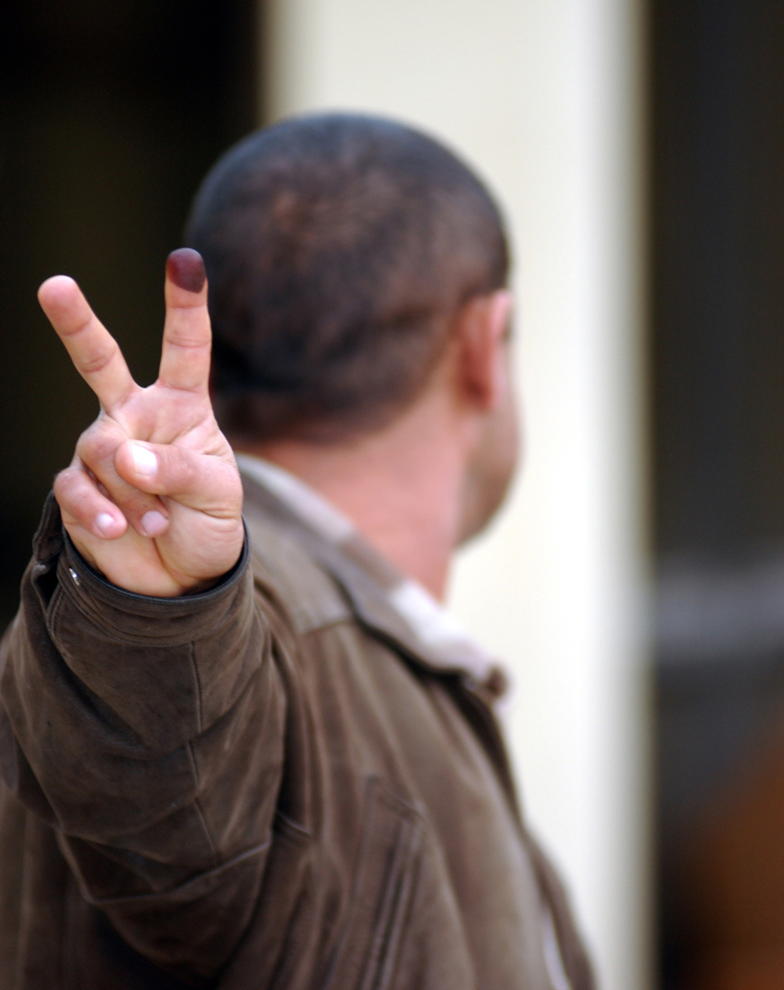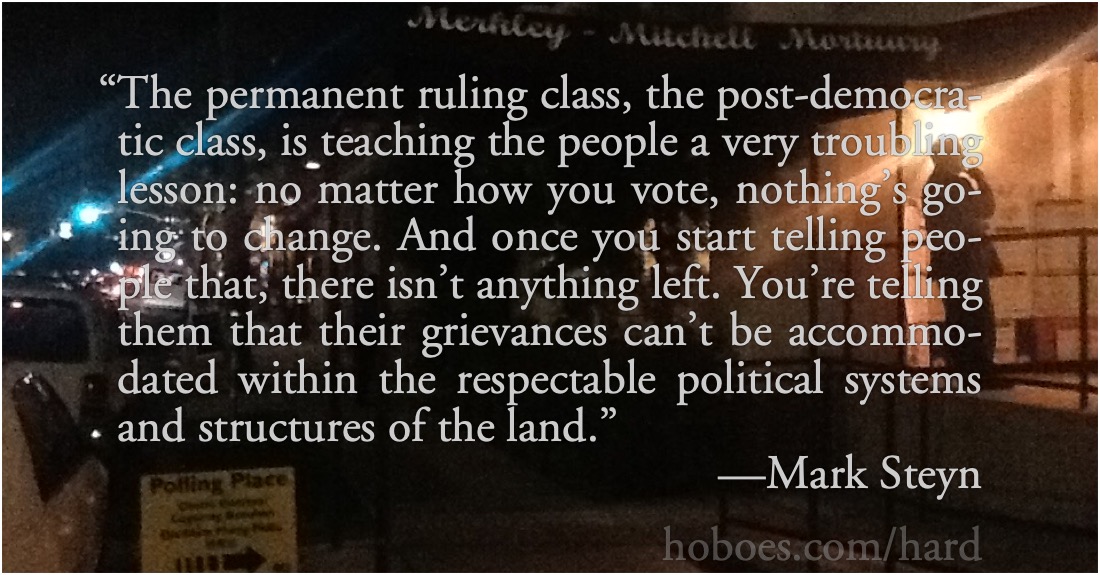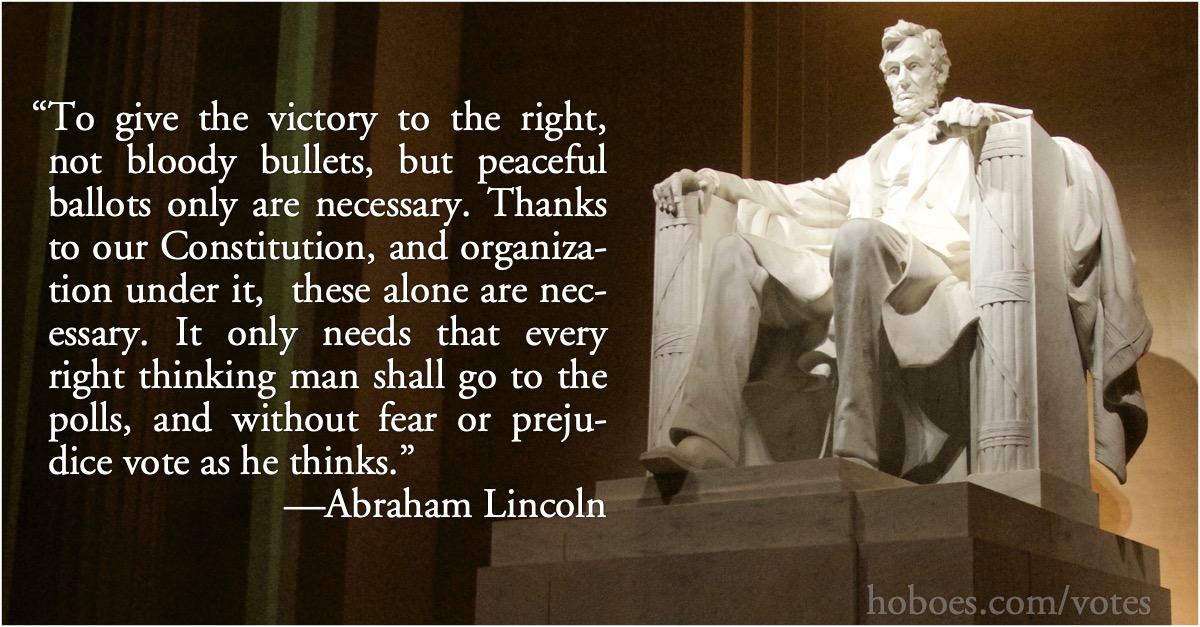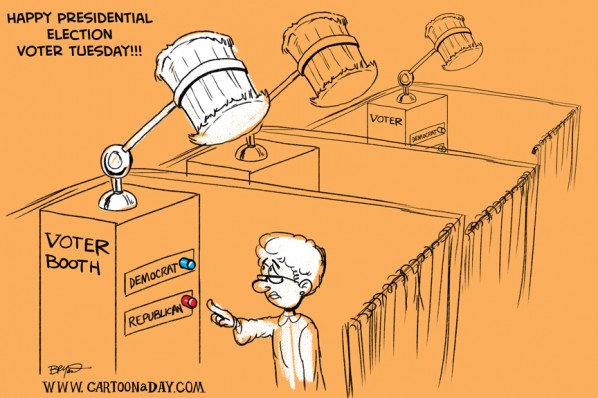You don’t need papers to vote
This was a pretty boring election for me. I’m not in the 50th, and so I received practically no junk mail. I am glad to see that the tax on rich bachelors failed. Someday I’d like to be one.
I hadn’t even seen the Busby “you don’t need papers for voting”, until I went to look for the results of this primary in the news. From the transcripts I’ve seen, it doesn’t look like Francine Busby was encouraging anyone to vote without papers. Her “you don’t need papers to vote” is just a quote taken out of context.
Toward the end, a man in the audience asked in Spanish: “I want to help, but I don’t have papers.”
It was translated and Busby replied: “Everybody can help, yeah, absolutely, you can all help. You don’t need papers for voting, you don’t need to be a registered voter to help.”
This sounds to me as though she was saying that you don’t need voting papers to help out with her campaign. But whether she misspoke or not, it is true: you don’t need papers to vote. At least, not at my precinct. You do have to know your name, or, more specifically, a registered voter’s name. Or something close to a registered voter’s name.
When I vote, I normally provide my voter’s guide so that it’s easy for them to look me up. So I had no idea what was actually required. Because of the general immigration controversy this time around, I thought I’d see just what was needed. So, I deliberately left the voting guide in my purse when I went in to vote.
- “Which street do you live on?” I told them the street, and was directed to another room.
- “What’s your name?” I told them my name (Jerry Stratton) and was shown my line on the list of registered voters (Jerold M. Stratton). Yes, that’s me.
- And then (because I’m registered as Independent) they told me my options for voting, I chose one, they gave me my ballot, and I went behind a cardboard box to vote.
I volunteered no information. I was questioned only for my street (in the hall), and my name (in the next room). If my street had “changed” after being directed to my precinct’s room, I don’t think anyone would have noticed.
- March 3, 2021: Write your rep on ballot security and open elections
-
Our voting system is hopeless archaic. Literally so. The techniques we use to validate elections predate every basic rule of auditing learned in the financial industries since the dawn of the industrial age. And when a ballot count fails even that ridiculously low barrier, nothing happens. We need to update our election procedures to use modern auditing techniques, in a self-auditing manner. If we can also update our elections to use simple, reliable technological innovations that are older than our youngest voters, that’s a bonus.
In states where we know elections are corrupted already, it’s going to be difficult. But we should try. It is especially important that we update our procedures in states where we think elections are mostly trustworthy.
If you trust your state’s election procedures, now is the best time to ask for better security and more openness. By the time you don’t trust your state’s election procedures, it’s probably too late.
But there are also states where a lot of voters don’t trust their elections, but their representatives are nominally in support of secure elections. There’s a chance those are fixable, too.
I’m not going to say, “try to change it anyway, what can it hurt?” because we’ve passed that stage: there is a chance it will hurt, that fighting for open and secure elections will make you a target. Whether the reward—an America where everyone’s vote counts, where legal votes are not drowned out by fraud—is worth the risk is up to you.
This is what I sent to my Texas reps. You will want, of course, to highlight where your own state’s election procedures need updating and strengthening; and you may well disagree with me both on what I put in and what I left out.
Or throw it out completely and write your own, using what you know about your state’s election procedures. But one way or another, secure, self-auditing elections are critical to a democracy. Not just for the election itself but for people’s trust that their voice makes a difference, that their vote makes a difference. Without that trust, democracy falls apart.
- February 17, 2021: Bean counting and ballot counting
-
I saw this from someone inadvertently bolstering Trump’s claims:
Dear Mission Federal Credit Union, I just want you to find 11,780 dollars in my savings account. Everyone there has miscounted.
They thought that was making fun of Trump, but in fact it points out a very severe deficiency in how we handle elections. What would happen if he actually made that request is that Mission Federal would take it seriously and do an investigation. They wouldn’t stonewall and gaslight him and tell him it’s not enough money to worry about.
I’ve dealt with Mission Federal—they used to be my credit union. Like any bank or credit union, if you show them that your savings account total plummeted inexplicably in the early morning, you won’t need affidavits for them to open an investigation, and it will be thorough. In fact, if it turns out that the total in one part of their system does not match the total in another part of their system, they won’t even wait for you to contact them. They’ll open an investigation immediately whether you ask for one or not.
The few times there’s been fraudulent use of one of my credit cards, the bank noticed it before I did. They didn’t stonewall and say there was no fraud, or wait to see if I noticed it and then ridicule me. They fixed it, and let me know what they’d done.
Banks and credit unions know that miscounts happen. They know that fraud happens. And so they keep multiple records of the same data from different sources in order to verify different counts against each other. They maintain a chain of custody for assets handled by employees whether the assets are physical or digital. They recognize the signs of fraud and automatically investigate when they see those signs.
If you ask to see your canceled checks, you’ll be able to see them immediately or nearly so. There’s probably already an online system for you to request canceled checks for any reason whatsoever without any arguing with the institution’s officials about whether you need them or not.
- September 24, 2015: Voting should be special, not stupid
-
There is a general rule of thumb in psychology: the easier you make it to do something, the less that something is valued. If you can do it any time, why do it now? If you can do it from anywhere, why do it from here? If there’s nothing special about it, who cares?
The way to fix voting is to make it special again. It should be something worth doing and worth taking seriously.
Expanding voting day to voting week and voting month; widening the voting booth to the voting mailbox; and computerizing the voting ballot so that there is no artifact of voting given away; all makes voting something so stupidly easy that it isn’t surprising few people take it seriously.
Block any and all attempts to safeguard elections from vote fraud, and you’re saying that voting isn’t worth safeguarding.1
Who hasn’t heard supposedly smart people say that voting is a waste of time? That’s because the value of voting is, for them, so low that the time spent doing it, even though it’s easier than ever, exceeds that value.
We are long past the days of poll taxes and armed Democrats keeping blacks away from the voting booth. Voting has become so easy that it’s not valued. The fix is to turn voting into something that must be thought about, and make it a day when it can be celebrated.
Now, obviously, election day should be secured from vote fraud, because when vote fraud is easy, people legitimately believe that their vote doesn’t matter. But it’s also important that voting should be a single day, a day when everyone votes. This turns it back into a celebration, and it also turns it back into something to be planned for, an end date for research.2
Absentee ballots should be limited to those for whom it truly is a physical hardship to get to the voting booth. A refusal to adjust your schedule to come to the voting booth on election day means voting is not your priority. If voting is not a priority for you, you don’t deserve an absentee ballot. Having to go somewhere special to vote helps make voting special.
- August 15, 2013: Crowd-sourcing vote fraud detection
-

Voter ID is in the news again, because North Carolina has just required photo identification to vote in person. I find it crazy that this is even controversial, given how important voting is. As usual, people are suing, claiming that they won’t be able to vote when they already have an id. This has become standard: the lawsuits enter discovery and it turns out they already have a valid id or can easily acquire one.
North Carolina has also shortened the absentee voting period from 17 days to 10 days, eliminated same-day voter registration, and eliminated registering people who aren’t yet eligible to vote in North Carolina but might be some day. Their law did not eliminate the absentee ballot loophole: if you vote absentee, no photo identification is required. But this also means that if you can’t get out of your house to visit the DMV, you aren’t disenfranchised, because you’ll be voting absentee anyway.
I am not a fan of long voting periods or of turning voting into a barely noticeable task. Elections should be events that we want to celebrate, not chores to be gotten out of the way as painlessly as possible.
This means absentee voting should be retained for people who need it, not for people who cannot be bothered to vote in person. There absolutely should be some minimum requirement to plan ahead as you would for any important event. I would go as far as to upgrade those “I voted” stickers to hand stamps. Voting is a celebration of our democracy; we should treat it like one. We have no problem with hand stamps for parties and concerts. We should have no problem using indelible stamps or paint on election day at the ballot booth.
- November 11, 2012: A non-invasive alternative to voter id: on-site photo signatures
-
I just had a thought about voter id. The fact that you voted is public information. The list of people who voted is out there and available to anyone who wants to look. When you vote, you sign in where your name is, and that sign-in sheet is public.
Someone who votes in your name isn’t likely to get caught, because signatures aren’t traceable. But if the fact that you voted is public information, why not require a “photo signature” in addition to the written signature? Digital cameras are cheap nowadays, certainly compared to the more and more complex voting process. Why not take a photo with each signature, and allow campaigns to identify people who were voting under a name not their own?
Vote fraud is rarely prosecuted today and everyone knows it. It is easy enough to get a list of names that never vote, and impossible to police stealing votes under those names. That’s because it is impossible to positively identify the fraudulent voter in order to prosecute them for their crime.
A photo signature would change that. It would be a fairly simple technique that would make vote fraud more complex rather than making the policing of vote fraud complex. We would then have positive proof that vote fraud occurred and a photo of who committed it.
This would probably have the effect of moving most fraud to absentee balloting; ubiquitous absentee balloting is a fraud problem on its own.
- You don’t need papers to vote
- “Toward the end, a man in the audience asked in Spanish: ‘I want to help, but I don’t have papers.’ It was translated and Busby replied: ‘Everybody can help, yeah, absolutely, you can all help.”
- Busby on defense, says she misspoke
- “Busby said that Republicans are now twisting her words. She does not in any way support or advocate that illegal immigrants vote, she said.”
- It Takes a Village Meathead
- “In the past, the campaign has sought to inform parents and caregivers about how and why to improve the early development of their young children. Now we will seek to persuade all adults in California that maximizing early childhood defvelopment benefits everyone, and that they should therefore support state efforts to provide universally available early learning programs…”
- Taxing the rich to pay for preschool in California
- Yeah, okay, my bias is that I hate complicated tax systems. And I hate tax systems that pretend to be about taxing the rich and end up, in the end, taxing everyone. For that matter, while it beats the hell out of taxing the poor, I don’t particularly like singling out one class for taxes that benefit everyone. But I do love me some irony.
- Forget CA—50 Look At The State-Wide Result
- “Proposition 82 was a classic tax the rich entitlement ploy. It wasn’t just defeated, it was stomped into the ground—59.3% to 40.7%.”



